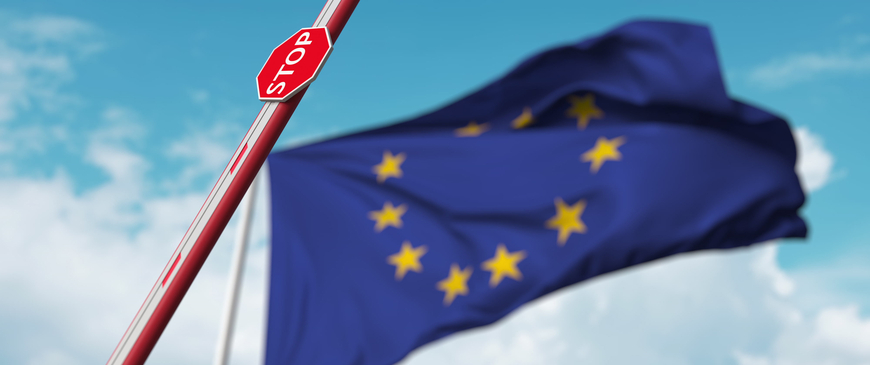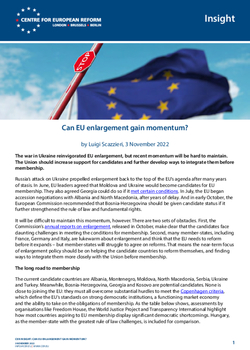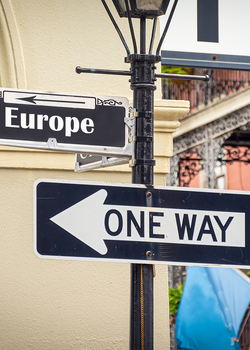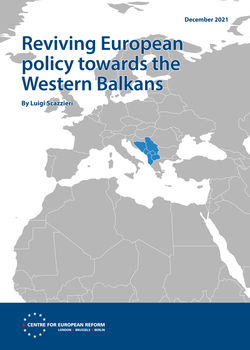
Can EU enlargement gain momentum?
The war in Ukraine reinvigorated EU enlargement, but recent momentum will be hard to maintain. The Union should increase support for candidates and further develop ways to integrate them before membership.
Russia's attack on Ukraine propelled enlargement back to the top of the EU's agenda after many years of stasis. In June, EU leaders agreed that Moldova and Ukraine would become candidates for EU membership. They also agreed Georgia could do so if it met certain conditions. In July, the EU began accession negotiations with Albania and North Macedonia, after years of delay. And in early October, the European Commission recommended that Bosnia-Herzegovina should be given candidate status if it further strengthened the rule of law and fundamental rights.
It will be difficult to maintain this momentum, however. There are two sets of obstacles. First, the Commission's annual reports on enlargement, released in October, make clear that the candidates face daunting challenges in meeting the conditions for membership. Second, many member-states, including France, Germany and Italy, are lukewarm about enlargement and think that the EU needs to reform before it expands – but member-states will struggle to agree on reforms. That means the near-term focus of enlargement policy should be on helping the candidate countries to reform themselves, and finding ways to integrate them more closely with the Union before membership.
The candidates face daunting challenges in meeting the conditions for membership.
The long road to membership
The current candidate countries are Albania, Montenegro, Moldova, North Macedonia, Serbia, Ukraine and Turkey. Meanwhile, Bosnia-Herzegovina, Georgia and Kosovo are potential candidates. None is close to joining the EU: they must all overcome substantial hurdles to meet the Copenhagen criteria, which define the EU’s standards on strong democratic institutions, a functioning market economy and the ability to take on the obligations of membership. As the table below shows, assessments by organisations like Freedom House, the World Justice Project and Transparency International highlight how most countries aspiring to EU membership display significant democratic shortcomings. Hungary, as the member-state with the greatest rule of law challenges, is included for comparison.

The Commission's annual enlargement reports paint a similarly discouraging picture of the progress of Western Balkans candidates and Turkey. In the frontrunner, Montenegro, negotiations made little progress due to government instability. The Commission thinks Montenegro is only "moderately prepared to cope with competitive pressure and market forces within the EU", needs to further reform its judicial system, and only has "some level of preparation" in fighting corruption.
Serbia has even further to go. According to the Commission, Belgrade has taken steps to improve judicial independence, passing constitutional amendments which now need to be implemented. But the pace of reforms has slowed and the government's commitment to pursuing EU membership is doubtful. President Aleksandar Vučić is seeking close relations with China and Russia, and Serbia has not signed up to EU sanctions on Russia. For accession negotiations to progress, Serbia needs to align fully with EU foreign policy, and further strengthen judicial independence, media freedom and the fight against corruption. Finally, Serbia needs to normalise its relations with Kosovo as a precondition for membership – and that has so far proven elusive.
Unlike Serbia, Albania and North Macedonia are unambiguously committed to securing EU membership. The Commission thinks that the two have made some progress with judicial reforms, but still need to do more in that area and to fight corruption. To progress with its negotiations, North Macedonia needs to pass a constitutional amendment to recognise Bulgarians as an official minority – but the government does not have enough support in parliament to do so.
Albania and North Macedonia are unambiguously committed to securing EU membership.
Ukraine and Moldova were not included in this year’s enlargement report, because they became candidates during the year. The Commission will assess their preparedness for membership by the end of 2022, and then include them in reports from 2023, along with Georgia. However, the Commission's June assessments on the three membership applications provide an overview of the key challenges. Ukraine is the most advanced: it has a "strong macro-economic record” and is "well advanced in reaching the stability of institutions guaranteeing democracy, the rule of law, human rights and respect for and protection of minorities". Moldova had a "solid" foundation to guarantee democratic standards and the rule of law, and its economic policies were "reasonably sound". But the Commission also said that both Ukraine and Moldova needed to further strengthen their judiciaries, fight corruption, curtail oligarchs’ influence, and modernise their public administrations. The EU’s decision to recommend granting Ukraine and Moldova candidate status was based on the understanding that they would implement the Commission’s recommendations on these issues, and accession negotiations are very unlikely to start until all member-states are satisfied of that.
Meanwhile, Bosnia, Georgia and Kosovo remain far from starting accession talks. It will take much effort for Bosnia to fulfil the EU’s conditions, not least because the country remains riven by internal divisions. The Serbian entity, the Republika Srpska, hindered the functioning of state institutions for much of 2022 and sought more powers for itself. As to Georgia, the Commission thinks it has “a foundation in place to reach the stability of institutions guaranteeing democracy, the rule of law, human rights and respect for and protection of minorities”; but its progress has been hampered by political polarisation, and a deal between the government and opposition brokered by European Council President Charles Michel in April 2021 broke down soon after. Kosovo remains very far from membership, as its application cannot progress until all EU countries recognise it as a sovereign country, and the remaining five are unlikely to do so until Kosovo normalises its relationship with Serbia.
Bosnia, Georgia and Kosovo remain far from starting accession talks.
Finally, Turkey is becoming increasingly distant from membership due to the deterioration in democratic freedoms there. Accession negotiations are suspended, and relations with the EU have become more fractious due to foreign policy disagreements. Tensions with Cyprus have intensified due to Ankara’s undermining of the UN-backed bizonal, bicommunal solution to the island’s conflict. And tensions with Greece have grown due to the revival of disputes over airspace and maritime borders, and to Ankara calling into question Greece's sovereignty over some Aegean islands and threatening to take them over by force. Furthermore, although Turkey has supported Ukraine by giving it drones, Ankara has not adopted EU sanctions on Russia, adding to tensions with the Union. Still, the member-states do not want to formally end negotiations, not least as there is a decent chance that Turkey’s opposition will win next year’s election, improving relations with the EU and conceivably reviving Ankara’s European integration path.
Is the EU ready to enlarge?
The pace of enlargement does not only depend on whether accession candidates fulfil the conditions for membership, but also on the existing member-states, which must unanimously agree to take forward each accession application. That provides many opportunities for countries to delay the process in pursuit of bilateral disputes unrelated to accession, as Greece and Bulgaria did with North Macedonia. And after negotiations to adopt all EU legislation are complete, member-states must unanimously approve new members’ accession. In the case of France, which has a high rate of enlargement scepticism, this is likely to require a referendum. Public opinion in other member-states (aside from Austria) has generally become more favourable to enlargement since the start of the war in February, but support could drop over time as the shock of the war wears off, or if the likely costs of enlargement come into focus.
Many member-states, such as France, the Netherlands and Denmark, think that enlargement carries risks for the EU. The June 2022 European Council conclusions state that the pace of enlargement depends not only on the progress of the candidates, but also on “the EU’s capacity to absorb new members”. One worry is that admitting new members risks making the EU even more unwieldy and slow, with more opportunities for member-states to delay or veto decisions that need unanimity. Another set of concerns stems from the experience of democratic backsliding in members like Hungary and Poland, and the limited tools that the Union currently has to counter it. Given the rule of law issues in the candidates, existing EU members want to ensure that democratic institutions there are much more firmly entrenched, to minimise the chances of backsliding once they become members.
One worry is that admitting new members risks making the EU even more unwieldy and slow.
Enlargement also poses difficult questions about migration, the EU budget and defence. Given the large income differentials between the candidates and the EU, there are concerns that enlargement would lead to large-scale migration to wealthier member-states. When it comes to funding, existing candidates would receive large amounts of EU funding as members. Net contributors to the EU budget would have to pay more, or existing beneficiaries would have to settle for less. Defence would also be an issue in the cases of Georgia, Moldova and Ukraine. All three currently have unresolved conflicts with Russia, whether active or frozen, and in case of war other EU member-states would have to assist them under the EU's mutual assistance clause. The potential for future conflict between Ukraine and Russia, which will exist until there is a mutually acceptable peace treaty, makes many member-states uncomfortable: the EU has shown it is willing to support Ukraine, but not at the cost of going to war with Russia.
EU leaders have not always openly expressed these concerns, but they have been clear that enlargement will not be easy. French President Emmanuel Macron has said that enlargement negotiations for the existing candidates would take a long time, in the case of Ukraine even “several decades”. And France, Germany and others have insisted that the EU needs to reform before it can enlarge. In his recent speech in Prague, German Chancellor Olaf Scholz pointed to three specific reforms: the extension of qualified majority voting to areas like foreign policy and tax policy, to prevent countries from abusing the veto; rebalancing the composition of the Parliament to ensure it does not become too big, while ensuring that the number of MEPs is proportionate to population; and reforming the Commission, to ensure it can function effectively even with more member-state representatives.
Enlarging the EU will require member-states to grapple with these issues. Reforms such as greater use of qualified majority voting are needed for the EU to become more effective, regardless of further enlargement. But many member-states are unwilling to give up their vetoes, especially in foreign policy. And some reforms are likely to entail formally revising the EU treaties, a complex and politically difficult process in which many member-states are reluctant to become embroiled.
The way ahead
The road to further EU enlargement is rocky, and inescapably entwined with the thorny debate on internal EU reforms. The risk is that EU reforms prove impossible and that enlargement loses momentum, leading to candidates becoming (even) more disillusioned with the Union, which could result in democratic backsliding. Failure to consolidate democratic institutions will leave countries vulnerable to Russian interference. In the Western Balkans nationalism could grow stronger, sharpening tensions between candidates and undermining stability. Russia could also exploit disillusionment to fuel grievances, particularly in Bosnia, to distract the West from the war in Ukraine.
The road to further EU enlargement is rocky, and inescapably entwined with the thorny debate on internal EU reforms.
EU leaders are aware of these risks and have been trying to maintain momentum and strengthen candidates by integrating them more closely before membership. One example is the Energy Community, through which the EU is integrating the Western Balkans, Georgia, Moldova and Ukraine into its electricity market. In 2020, the EU revised the EU accession process, to allow for gradual integration of candidates into the single market before membership. This will involve steps such as ending mobile roaming fees, granting data adequacy decisions to allow the free flow of personal data with the EU, and directing more funds to advanced candidates. The European Political Community (EPC) was also originally conceived to integrate candidate countries more closely. The inclusion of non-candidates like the UK and the fear from would-be members that they were being snubbed meant that the EPC developed in a slightly different direction, with the emphasis on co-ordination rather than integration. But the EPC can still be helpful in fostering convergence and co-operation.
Finally, the EU is providing support to the candidates to help buttress their economies and deal with the higher food and energy prices stemming from the Ukraine war. In particular, the EU has provided Ukraine with humanitarian assistance and over €3 billion of military support. It has also sought to bolster Kyiv’s economy and finances: it suspended import duties on Ukrainian exports and has provided Ukraine with €4.2 billion in financial assistance since February – part of a broader finance package of up to €9 billion in addition to member-states' bilateral support. To support the Western Balkans, in 2020 the EU established an ‘economic and investment plan’ worth up to €9 billion, to invest in transport, energy, and the green and digital transitions.
These efforts go in the right direction. But, while the Union has provided candidate countries with substantial support, this is unlikely to be sufficient – particularly in Ukraine’s case. Kyiv's needs are set to grow further and the IMF estimates that Ukraine will need between $3 and $4 billion a month in 2023 (pre-reconstruction). At the same time, despite accepting Moldova and Ukraine as candidates and starting negotiations with North Macedonia and Albania, the EU still suffers from a major enlargement credibility gap. This is exemplified by the Union’s refusal to grant visa-free travel to Kosovo, even though it has met all the EU’s conditions.
If they want to maintain momentum for reform in the candidate countries, EU leaders should further flesh out the concept of “gradual integration” with the Union, which they referred to in June. Specifically, the Union needs to show that gradual integration is a concrete possibility with tangible benefits. If the EU made greater funding available to the most advanced candidates, this would provide greater incentives for reforms and give the Union more leverage to counter democratic backsliding by threatening to cut funding. Meanwhile, developing mechanisms to consult candidate countries on policy areas in which they were fully aligned with the EU’s acquis would allow them to be involved in shaping decisions. Bringing together EU member-states and accession candidates more frequently to consult on policy might reduce enlargement scepticism.
EU leaders should further flesh out the concept of “gradual integration” with the Union.
Enlargement has long been one of the EU’s most successful policies, fostering economic growth and helping stabilise candidates for membership. But the challenge of reform in both the candidates and the EU itself mean that the current round of enlargement is likely to stall – with all the risks that entails. To avoid that, the EU will need to fully embrace the idea of step-by-step integration.
Luigi Scazzieri is a senior research fellow at the Centre for European Reform.




Add new comment